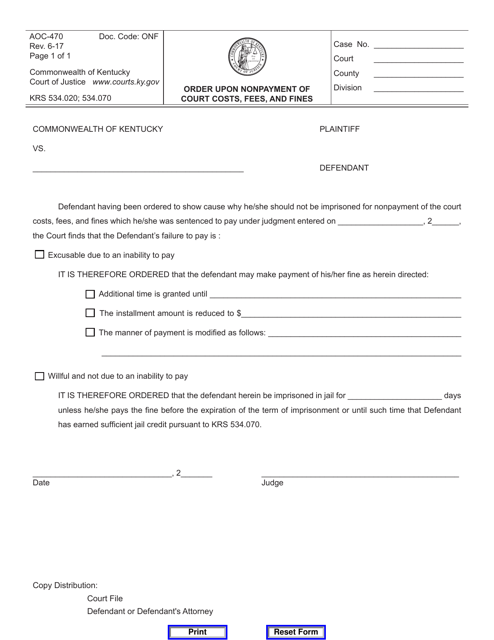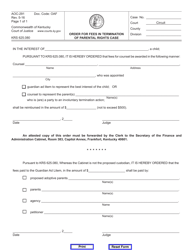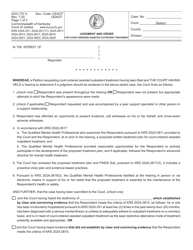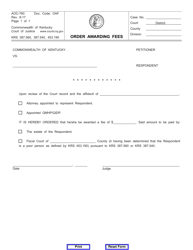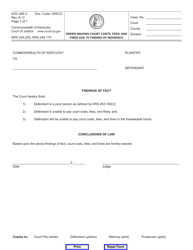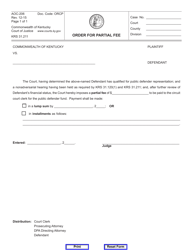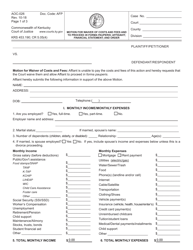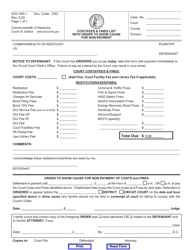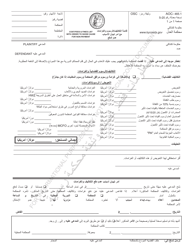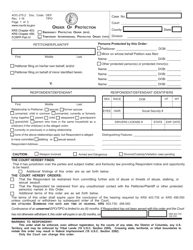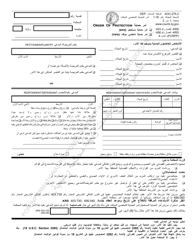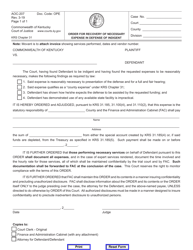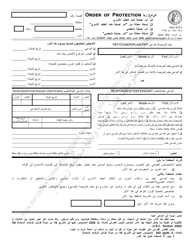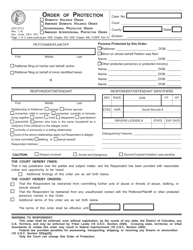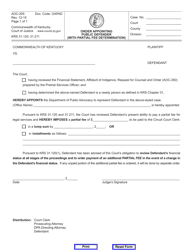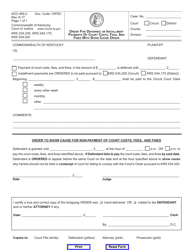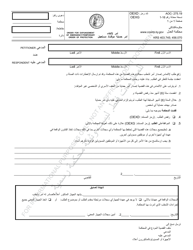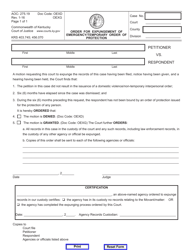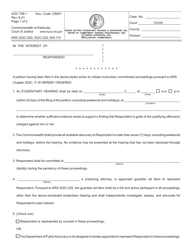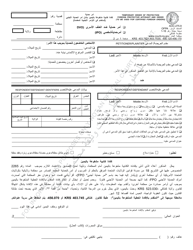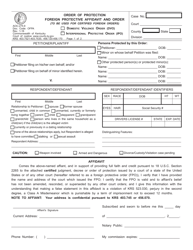Form AOC-470 Order Upon Nonpayment of Court Costs, Fees, and Fines - Kentucky
What Is Form AOC-470?
This is a legal form that was released by the Kentucky Court of Justice - a government authority operating within Kentucky. As of today, no separate filing guidelines for the form are provided by the issuing department.
FAQ
Q: What is Form AOC-470?
A: Form AOC-470 is an Order Upon Nonpayment of Court Costs, Fees, and Fines in Kentucky.
Q: When is Form AOC-470 used?
A: Form AOC-470 is used when an individual fails to pay court costs, fees, or fines.
Q: What does Form AOC-470 do?
A: Form AOC-470 allows the court to take action against a person who has not paid court costs, fees, or fines.
Q: Who can use Form AOC-470?
A: Form AOC-470 can be used by the court to enforce payment from an individual who owes court costs, fees, or fines.
Q: Is Form AOC-470 specific to Kentucky?
A: Yes, Form AOC-470 is specific to Kentucky courts.
Q: Is there a deadline to file Form AOC-470?
A: The court may have specific deadlines for filing Form AOC-470. It is best to consult with the court or an attorney for specific guidance.
Q: What happens if someone does not comply with Form AOC-470?
A: If an individual does not comply with Form AOC-470, the court may take further action to collect the unpaid court costs, fees, or fines.
Q: Can I challenge Form AOC-470?
A: You may have the right to challenge Form AOC-470. It is recommended to seek legal advice to understand your options.
Q: What are the consequences of not paying court costs, fees, or fines?
A: Failure to pay court costs, fees, or fines can result in various consequences, such as additional fees, driver's license suspension, or possibly being held in contempt of court.
Q: Can I negotiate a payment plan for court costs, fees, or fines?
A: It is possible to negotiate a payment plan for court costs, fees, or fines. You should contact the court or an attorney to explore this option.
Q: What should I do if I cannot afford to pay court costs, fees, or fines?
A: If you cannot afford to pay court costs, fees, or fines, you should communicate your financial situation to the court. They may be able to offer alternative options or assistance programs.
Q: Can I go to jail for not paying court costs, fees, or fines?
A: In some cases, failure to pay court costs, fees, or fines can result in being held in contempt of court, which may lead to jail time. However, this varies depending on the circumstances and jurisdiction.
Q: Can the court garnish my wages to collect court costs, fees, or fines?
A: Yes, the court may have the authority to garnish your wages or seize assets to collect unpaid court costs, fees, or fines.
Q: Is legal representation recommended when dealing with Form AOC-470?
A: While you have the right to represent yourself, it is often recommended to seek legal representation, especially if you have concerns or questions about Form AOC-470.
Q: Are there any exemptions or waivers for court costs, fees, or fines?
A: Some jurisdictions may offer exemptions or waivers for individuals who cannot afford to pay court costs, fees, or fines. It is best to consult with the court or an attorney to explore these options.
Q: Can Form AOC-470 be used for any type of court case?
A: Form AOC-470 can generally be used for any type of court case where there are unpaid court costs, fees, or fines. However, it is important to confirm its applicability with the court.
Q: Can Form AOC-470 be used for criminal cases?
A: Yes, Form AOC-470 can be used for criminal cases where there are outstanding court costs, fees, or fines.
Q: Can Form AOC-470 be used for traffic violations?
A: Yes, Form AOC-470 can be used for traffic violations where there are unpaid court costs, fees, or fines.
Q: Can Form AOC-470 be used for civil cases?
A: Yes, Form AOC-470 can be used for civil cases where there are unpaid court costs, fees, or fines.
Q: What should I do if I receive a Form AOC-470?
A: If you receive a Form AOC-470, it is important to review it carefully and take any necessary action. Consult with the court or an attorney if you have questions or concerns.
Q: Can I appeal an Order Upon Nonpayment of Court Costs, Fees, and Fines?
A: It may be possible to appeal an Order Upon Nonpayment of Court Costs, Fees, and Fines. Speak with an attorney to understand the appeal process and your options.
Q: Does Form AOC-470 affect my credit?
A: Failure to pay court costs, fees, or fines may have an impact on your credit score. It is best to address any outstanding obligations to minimize potential credit implications.
Q: Are there any resources for financial assistance with court costs, fees, or fines?
A: Some jurisdictions may offer resources or assistance programs for individuals who are unable to pay court costs, fees, or fines. Contact the court for information on available options.
Q: Can the court revoke my driver's license for nonpayment?
A: Failure to pay court costs, fees, or fines can lead to the suspension or revocation of a driver's license. It is important to address any outstanding obligations to avoid this consequence.
Q: Can I request a hearing to dispute court costs, fees, or fines?
A: In some cases, you may be able to request a hearing to dispute court costs, fees, or fines. You should consult with the court or an attorney to understand the process and requirements.
Q: What should I do if I disagree with the amount of court costs, fees, or fines?
A: If you disagree with the amount of court costs, fees, or fines, you should raise your concerns with the court. They may be able to review or adjust the charges.
Q: Can I get an extension to pay court costs, fees, or fines?
A: Depending on the circumstances, the court may grant an extension to pay court costs, fees, or fines. It is important to communicate with the court and provide a valid reason for the request.
Q: Will the court consider my financial situation when determining payment?
A: The court may consider your financial situation when determining payment options or potential waivers. It is important to provide accurate and detailed information to the court.
Q: Can I get my court costs, fees, or fines reduced?
A: In some cases, it may be possible to get court costs, fees, or fines reduced. Consult with the court or an attorney to explore this option.
Q: What are the potential consequences of ignoring Form AOC-470?
A: Ignoring Form AOC-470 can lead to further legal actions to collect the unpaid court costs, fees, or fines, which may include wage garnishment, asset seizure, or other enforcement measures.
Q: Can Form AOC-470 be used by individuals who owe child support?
A: Form AOC-470 is typically used for court costs, fees, and fines. If you owe child support, you may need to follow a different legal process. It is recommended to consult with the appropriate authorities or an attorney.
Q: What should I do if I have multiple outstanding court costs, fees, or fines?
A: If you have multiple outstanding court costs, fees, or fines, it is important to address each obligation individually. Contact the court or an attorney for guidance on how to handle multiple cases.
Q: Can I negotiate a settlement for unpaid court costs, fees, or fines?
A: In some situations, it may be possible to negotiate a settlement for unpaid court costs, fees, or fines. Consult with the court or an attorney to explore this option.
Q: Can I request a fee waiver for court costs?
A: Some jurisdictions may provide fee waivers for individuals who cannot afford to pay court costs. Contact the court or an attorney for information on fee waiver eligibility and application process.
Q: Can Form AOC-470 be used for outstanding restitution orders?
A: Form AOC-470 is typically used for court costs, fees, and fines. If you have an outstanding restitution order, you may need to follow a different legal process. Consult with the appropriate authorities or an attorney.
Q: Can I be arrested for not paying court costs, fees, or fines?
A: While failure to pay court costs, fees, or fines may lead to legal consequences, arrest is usually a last resort. However, it is essential to comply with court orders and address outstanding obligations.
Q: Can Form AOC-470 be used for outstanding child support payments?
A: Form AOC-470 is typically used for court costs, fees, and fines. If you have outstanding child support payments, you may need to follow a different legal process. Consult with the appropriate authorities or an attorney.
Q: Can Form AOC-470 be used for outstanding alimony payments?
A: Form AOC-470 is typically used for court costs, fees, and fines. If you have outstanding alimony payments, you may need to follow a different legal process. Consult with the appropriate authorities or an attorney.
Form Details:
- Released on June 1, 2017;
- The latest edition provided by the Kentucky Court of Justice;
- Easy to use and ready to print;
- Quick to customize;
- Compatible with most PDF-viewing applications;
- Fill out the form in our online filing application.
Download a fillable version of Form AOC-470 by clicking the link below or browse more documents and templates provided by the Kentucky Court of Justice.
